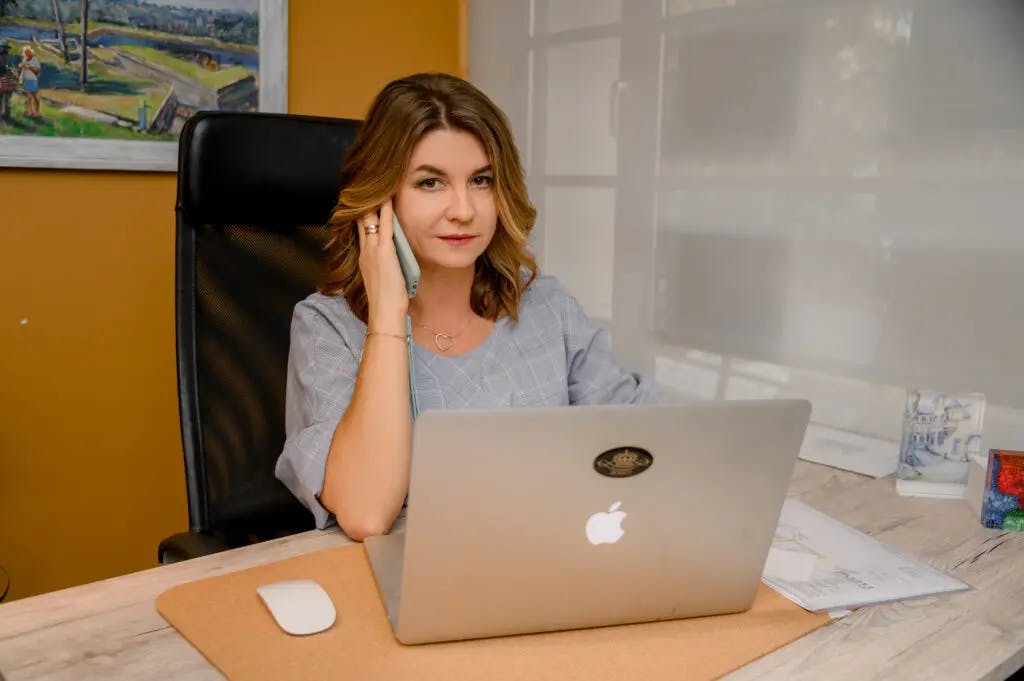Rental secrets in Luxembourg you won't hear anywhere else
An interview with a real estate agent about renting in Luxembourg: prices, documents, deposits, agency fees, scams, and common tenant mistakes.

My name is Irina Bettendorf, I am a real estate agent. I moved to Luxembourg with my friends' assistance more than 20 years ago.

Back then I didn't have a European surname or a European passport. After many years of immigration and social integration, through work, studies, and continuous volunteering for various associations, all this came to me. Following the divorce, we found our soul mates, first my husband and then, 15 years later, me.
My journey to the Grand Duchy was not trivial either, as we came from Cuba.
In Luxembourg I have:
- worked in many areas of employment;
- got a second degree;
- coached a basketball team;
- trained and served as a basketball referee for three seasons;
- rented an apartment with my husband;
- looked for an apartment as a single mother;
- experienced firsthand all the pitfalls of renting a place to live;
- trained to become a real estate agent;
- have been helping a wide variety of people find a roof over their heads in the Grand Duchy for many years, whether buying or renting.
Whether you are just considering renting, buying, or selling a house in Luxembourg or are already busy looking, check out my experience. The first thing we all do when arriving in the country is looking for an apartment to rent.
Do not underestimate the social capital
When we got married, my first husband and I moved to Liberty Island, his homeland. It wasn't easy there and basically, there was nothing but freedom. Once the situation reached a limit, some friends in Luxembourg helped us out. They arranged both visas and passports. We would not be here without them, of course – everything is extremely expensive.
No need to hide the fact that we were very lucky. We were just pulled out of one life and given everything, documents, and primary housing, to start another. All we had to do was to find a job on our own, cause there is no way to be jobless here.
However, this issue was not an easy one for us. Anyone who moves on a work contract knows that you have to be either a unique specialist or the highest-level expert to be needed in Luxembourg. That was not the case – we were both geologists. I ended up studying law at the Sorbonne and took a course for real estate agents, but that's a story for another day.
Why is it still hard to rent an apartment: 20 years ago vs. now
Housing availability in Luxembourg, or more precisely its unavailability, is not a recent problem.
Back in the day. A little more than 20 years ago, when I moved here, there was a war in Yugoslavia. So many refugees escaped Serbia, Croatia, and nearby countries. Refugees and people with diplomas are very different categories of people and were not treated equally by landlords.
Now. The situation has only gotten worse since then. Many new housing units have been built. And new is always more expensive, so people have to take loans and pay them off. That means you can't simply ask your tenant to pay lower than the mortgage would be. Plus there are utilities and such.
If we look at the statistics, in the second quarter of 2022 the number of houses available for rent is down 5%, and apartments are down 14%, compared to the same numbers in 2021. At the same time, renting prices only grow. This is a natural process, and it will be continued.
Why so?
- For the last 10 years, highly qualified specialists have been coming to Luxembourg. Those people already have working contracts and high salaries at the moment. Along with high salaries come higher-priced rents.
- At the same time, there are still a lot of refugees, single mothers, and workers from other countries with relatively modest incomes. And the market is supposed to adapt to them, which means that there should be more housing. But...
- Developers are unable to keep up with the growth of the migrant population, and often cannot just build where there is room. State policy requires that green space stay green. It could be decades before they turn into residential communities.
What can you afford for 2400 euros in Luxembourg City
When moving to Luxembourg you have to be prepared for the fact that the majority of your salary, no matter how high it is, will pay the rent. And so not all the variety of housing will be available for you with a specific level of income.

For example, with a salary of 2400 euros, you can only afford an apartment, probably even a studio, in the metropolitan area. Not a house. If we are talking about more or less comfortable accommodation, then the rent limit for such a salary would be 1500 euros.
Speaking of cost, the law clearly states that the annual rent cannot exceed 5% of the amount invested in the property. The law is going to change in 2023, reducing this figure, which will please tenants only.
Whether it's a loan or your own savings, it will take you 20 years to fully recoup the cost of your property. To put it simply.
However, the interesting thing is that houses and apartments are so expensive nowadays, that almost no one sets this 5%: as this amount is too harsh for tenants in Luxembourg, landlords usually set the rent about 2-3%.
Two main principles of accommodation search
The country is divided into 12 cantons, each of which has a key city to orient yourself to. If you look at the map, there is a huge spread of prices. For example, there is Luxembourg and the northern canton of Vianden.

The same studio will cost, say, 1400 euros in the capital and 1000 euros in Vianden. And the distance between these cities is only about 60 kilometers.
Accessibility and comfort
The first rule of looking for a roof over your head, especially if you do not have a car, is to look closer at your work.
If you already work outside the capital or in a bigger city, it is better to look at the place of employment. If you work in the capital, you can look for places where there is a bus or train connection.
Rent-to-salary ratio
This ratio is also very important because there is an unspoken rule, but the law doesn't say that. No landlord will rent you an apartment unless your family's income is mathematically three times the rent plus utilities.
Example
There is a studio for 1500 euros + 200 euros for utilities. How much should the family earn? If their budget is about 5000 euros, then such an application, maybe, will do. Because 1700 multiply 3 turns out to be 5100. If the family earns 3000 euros, no one will rent them anything. But it's impossible to refer to a law or document because they do not exist. It's just the way it's done.
Why am I talking about a budget of a theoretical 2400 euros? When there is a flood of refugees, like in the late 90s and now, the average salary of these people is just about this amount, sometimes a little more. European people working in European Institutions (Institutions européens) are paid much more and can afford rent from 3000 euros per month.
But do not be discouraged, you just need to move towards the northern or northeastern cantons. And you could also consider Esch-sur-Alzette.
Where to look for a rent
In fact, there are plenty of ways to find a place to live in.
Special websites
Surely they exist here:
These are official portals, which put up apartments from agencies and are not in the business of matching potential customers. How does the scheme usually work?
An agent publishes advertisements on the portals, and the users receive them through mailing lists or find themselves, while actively surfing the virtual pages of the portals, dreaming to find a roof over their heads. The agent starts getting calls from unknown numbers from people who want to sign up for a viewing, and so on.

What's the downside? It's not the fastest process. As an agent, you don't know the person who is looking for an apartment. You need to meet them, and understand what their psychological and financial situation is, where they work, and how much they make. You can't discuss such things over the phone, some people refuse even to give their surname.
Only after this work is done, it makes sense to take the tenant to look at the apartment.
Social Media
Facebook, LinkedIn, Internations, Instagram, and internations.org give you a chance to check out the person right away, find out where they work, and estimate how much their salary is. It's something that can simplify the interaction between tenant and landlord. You can contact an agency if you don't want to search on your own.
Agents
We have our own apartment listings with owners' requests, locations, and other facts that help to sort the requests better. This saves time and allows us to work more efficiently.
Documents a tenant will need
If we're talking about someone who already works here and has a contract, it's simple:
- A work contract.
- Passport or residence permit, any legal document that grants the right of residence.
- The last three payslips. It is very important to understand who the person is, who they work for, what company they are employed by, and whether they have a steady paycheck. This makes a tremendous difference for landlords.
- If you have children, it would be very helpful to have a certificate of a family membership. Or at least a written mention that there are children and what age they are.
If there is no work contract, the context must be examined. Actually, each situation has to be considered individually.
Which expenses to prepare for
The most important thing in renting an apartment is the money. When a person wants to rent a place, they should be prepared for impressive expenses right on the first day.
Where do they come from:
- The tenant always pays for the first month's rent in advance.
- Normally he has to pay a deposit as well. Usually, the deposit is the equivalent of 2 to 3 months' rent. Sometimes it is not required, but this is rare.
- You have to pay the agent's fee if you use the services of an agent. Unfortunately, it is the person concerned, i.e. the tenant, who pays. Agent's fee is the amount of one month's rent and 17% on top. That is, for a studio that costs 1000 euros you will have to pay 1170 euros to an agent. An apartment or house with 3000 euros cost – 3510 euros.
The agent acts on behalf of the owners of the apartment, knowing their needs, and his role is to find the tenant that will satisfy the owner. Not the other way around!
However, it is not the owner but the tenant, who pays the agent's commission. This is a paradox, but it has been established for years because the long-term rental housing offer (a year or more) is much lower than the actual demand.
In fact, I think that a fixed rate or an equal split of agency fees between tenant and landlord would be a fairer policy.

Think about it, even with the example of one miserable studio for 1000 euros we get a pretty hefty sum of money for the tenant to pay:
- 1000 euros for the first month;
- 2000-3000 euro deposit;
- 1170 euros agency fee.
That's about 4-5 thousand. And insurance! You should do it beforehand. Frequently when signing the contract you will be asked to show the insurance contract. Overall, one-sided agency fees and excessive deposits make life very difficult for everyone, as it seems to me.
Most important. The deposit payment does not cover the cost of the rent! This is spelled out in every contract.
So this money can be used to repair the house after the move-out, for amortization, so to speak. Or to pay off utility bills that you owe. But you have to pay your rent regularly. Even if it rains in the apartment and a jet flew in it.
What should you consider when checking out the apartment
One of the most important steps is coming to the viewing. That is when the contract will be signed and the certificate of acceptance will be handed in – these are the most important documents that act as a guarantor for both parties. This entire job is left on the shoulders of the agent if you have one.
Basically, it's a complete inventory of the apartment, whether we're talking about moving in or moving out: you need to get the meter readings, to document everything in the apartment. When you move out, you will have to return the apartment in the same condition as you received it. Repaint where necessary, fix the holes you drilled for your paintings, etc.
Remember
- Most contracts mean a ban on subletting, even if it's not spelled out.
- So if the landlord, seeing you for the first time, says, " Live in, no contract," then there's a trick. Probably this person does not own the apartment, or the apartment is for sale. Or when the rent is paid in cash, this does not give any guarantees and rights to the tenant. Agents always verify this.
- People often sign contracts without reading them, but you have to inspect every line like your life depends on it.
- If there is an opportunity to change something in your favor, you should do it.
- When a person moves to a foreign country, there is stress and sometimes panic. They are happy with any kind of accommodation. But later it can lead to bigger problems. So it is better not to rush with the choice.
- If there is a language barrier, it is definitely worth asking for help from a specialist. It can also be useful on various occasions. For example, the third party in the dialogue when viewing the apartment helps to avoid awkward moments. The landlord has no need to ask how much the candidate earns, or how reliable he or she is. The agent does that. He also finds the words to soften the situation if the owner of the apartment is absolutely unwilling to see the potential tenant.
- It is best to accompany the certificate of acceptance (inventory) with photographs to avoid controversial situations.
Problems mothers with kids face
A separate category that I strive to help. This is something I feel is a duty to help because I recognize what they've been through. When I divorced my first husband, nobody wanted to let me and my little child stay, although we had a decent divorce, no court, and no division.

There were all kinds of reasons: «Oh, we have carpets, we're afraid because of them», «Oh, we don't have enough space, we're afraid that your child won't feel comfortable living and growing up here», «Oh, we don't have a garden, he won't have a place to go for a walk». A lot of polite reasons that usually mean nothing.
One day I accidentally found out what the truth really sounds like. It's simple: «We're afraid that if you lose your job, you simply won't be able to pay your rent and support your child, and we can't even evict you».
So I solved this problem this way: I started showing up for the viewing by myself. This allowed me to enter the apartment, evaluate everything on my own, and then tell them on the spot that I had a child, that I was divorced, and that everything was fine at work and in our relationship. And it worked!
But for mothers who have been arriving in significant numbers in recent months, I always advise first reading the Grand Duchy regulations. Perhaps they are entitled to social housing. And my second piece of advice is to look for housing that has already been paid for. It might be an older building, but the rent is probably cheaper there!
How not to be scammed when you rent
There are dishonest citizens everywhere, in any field, even in such a progressive country as Luxembourg.
What should make you 100% suspicious
- Reluctance to sign a contract. I never get tired of repeating this story over and over again: when they do not want to sign a contract with you or propose to do it sometime later, it is a scam. It is quite possible that one day you will return home, and you will find new locks on the door and different people living there.
- Surprisingly cheap housing. For example, a fully furnished beautiful apartment for 800 euros. You may even be invited to see it! But at the last moment, right on the day of viewing an hour or two before that, the text will come: "Sorry, I do not have time to meet, I work today. Somebody will bring you the keys. But since it is a third party, you have to transfer us 1000 euros, since we pay him, plus it will be a warranty". And a lot of people do it! When you see a beautiful picture and a low price – check out minimum rental prices on housing sites in this area. No one will ever set it lower as this is the market, and its rules are strict.
All these are only some of the situations that I deal with during counseling. The most important rule of apartment search should be as follows: if you have doubts, fear, or uncertainty about anything - consult a professional. Not a single client got disappointed with me))
You can also read about the specifics of housing rentals and the details of entering a contract in the Relocation Guide:
Share your stories with us. If you would like to tell us about moving to Luxembourg and about life here, please write to our editors via Telegram or email editorial@luxtoday.lu. One person's experience can help many.